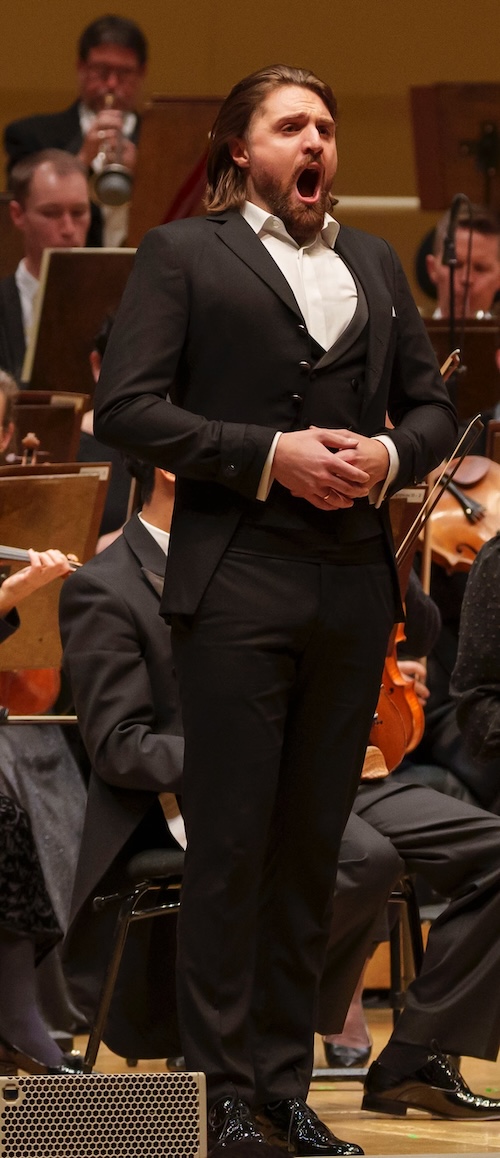Baritone lifts the CSO’s mixed seafaring program with Gabel

The Chicago Symphony Orchestra’s penultimate program of 2024 could be called, with apologies to Mendelssohn, “Stormy Seas and Noisy Voyages.”
Thursday night’s seafaring program was not one for subtlety or, often, polish, with conductor Fabien Gabel leading performances that were often characterized by volume more than tonal refinement or musical insight. Still, amid the mixed results there were enough worthy moments to provide some welcome warmth on a chilly night.
Storm-tossed seas formed the leitmotif for three of the evening’s four works, leading off with Benjamin Britten’s Four Sea Interludes from Peter Grimes. One would think that these scene-setting intermezzi from Britten’s opera are about as fail-safe a concert staple as exists, but think again.
Gabel’s literal, blunt-edged direction was all on the surface, showing little engagement with or understanding of Britten’s music. “Dawn” was thrown off with zero atmosphere or mystery, while the amiable bustle of “Sunday Morning” was completely lost in Gabel’s overloud, souped-up rendition.
The ominous unease of “Moonlight” was presented in boldface italics rather than suggested with more nuanced dynamics. Predictably, the French conductor’s cataclysmic “Storm” was unleashed in bludgeoning and garrulous fashion, as if this were an orchestral showpiece that had no meaning beyond sheer decibels. The slack ensemble and maladroit entrances were a 180 from the orchestra’s finely focused precision under Dima Slobodeniouk last week.
The outlier amid the evening’s nautical theme was Mahler’s Lieder eines fahrenden Gesellen (Songs of a Wayfarer). Mahler wrote this intimate four-song cycle to his own texts in the wake of an unhappy love affair with soprano Johanna Richter. The second and fourth settings draw upon music that would find prominence in Mahler’s First Symphony, and the progressive tonality underlines the unsettled, searching qualities of the music, each song ending in a different key from which it began.
After the deafening assault of the Britten, it was a relief to encounter the subtle and sensitive artistry of Konstantin Krimmel in his CSO debut. The German singer’s light and flexible baritone proved ideally suited to this music and the soloist displayed total sympathy with Mahler’s challenging idiom.

Krimmel took a spacious tempo for the opening setting of “Wenn mein Schatz Hochzeit macht” (When my love becomes a bride) but sustained it superbly. Here and in the ensuing “Ging heut’ Morgen über’s Feld” (I went through the fields this morning), the singer underlined the Schubert-like folk quality of Mahler’s writing, Krimmel easily finessing the perilous high notes.
While sensitive to the pervasive sadness of these songs, the soloist also pointed up the contrasts in each setting, the fleeting optimism as well as the psychic desperation—as with the unhinged anxiety of “Ich hab’ ein glühend Messe” (I have a red-hot knife). Krimmel was at his finest in the tragic final setting, “Die Zwei blauen Augen” (The two blue eyes), the baritone slowing the pace down to the final words, which were magically floated in the hushed coda.
The last song showed more deft balancing, yet much of Gabel’s accompaniment was jarringly insensitive—at times burying Krimmel in bludgeoning fortissimos—and blandly inattentive to Mahler’s markings.
Tchaikovsky wrote six tone poems in addition to Romeo and Juliet, though one would never know it from the relative paucity of performances. One of the earliest and least often heard of his works in the genre is The Tempest, which was performed Thursday night.
Inspired by Shakespeare’s play, the oceanic motif is manifest in the undulating theme for strings that begins and ends the work, painting the ebb and flow of the waves. At 26 minutes, The Tempest feels a bit long-winded but its rich melodies and Tchaikovsky‘s polished craft surely make it worth hearing at least once for every ten performances of Romeo and Juliet.
Gabel’s direction of this work was more convincing and evinced a tighter grip than was displayed in the first half, notwithstanding the ill-tuned winds of the opening bars. The orchestra put across a majestic account of the thunderstorm conjured up by Prospero and gave sumptuous treatment to the soaring love theme for Miranda and Ferdinand in its increasingly impassioned iterations.
The evening ended with a belated CSO premiere, a suite of music from Erich Wolfgang Korngold’s film score for The Sea Hawk.
Some may sniff at this populist music being performed on a symphony subscription concert. But for those who came of musical age in Chicago in the 1960s—with repeated viewings of Errol Flynn swashbucklers Sunday afternoons on WGN’s Family Classics—that early exposure had a huge impact and one maintains great affection for Korngold’s sumptuous film scores.
Korngold’s music for the 1940 Sea Hawk is one of his finest efforts for Warner Brothers. Patrick Russ’s reconstruction of Korngold’s lost suite of music from the film is expertly done, and Gabel and the CSO delivered a duly rousing performance.
The Main Title, reflecting the swaggering bravado of Flynn’s title character, was put across with big and brassy panache. Under Gabel, the strings brought silver-screen opulence to the “Reunion” love theme (with a tasteful violin solo by Robert Chen), ceremonial grandiosity to the march of “The Throne Room” and conveyed every individual parry and thrust of the climactic “Duel.”
The program will be repeated 1:30 p.m. Friday and 7:30 p.m. Saturday. cso.org
__________
The CSO received a $50 million gift from Helen and Sam Zell on behalf of the Zell Family Foundation, the orchestra announced this week.
The “transformational gift” will provide funding to reducing debt over time, increase the CSO’s endowment, and pay for musician and staff retirement benefits. It will also support the CSO’s domestic and international touring activities, special artistic projects, and “digital content initiatives for marketing and promotion.” Read the press release here.
Posted in Uncategorized

